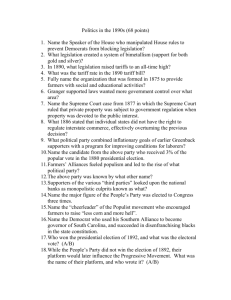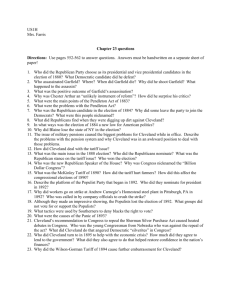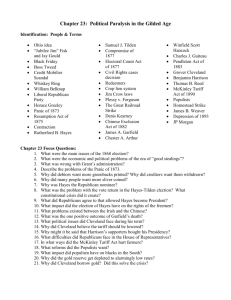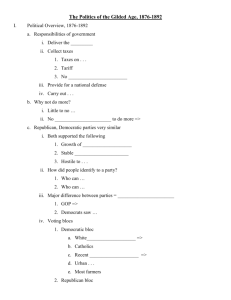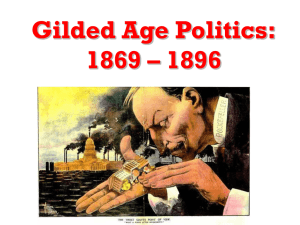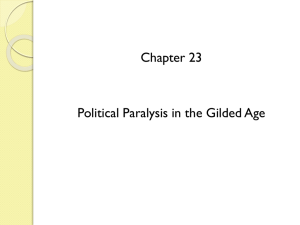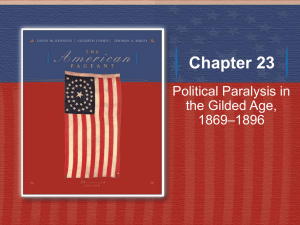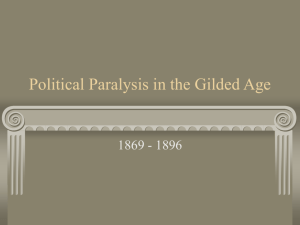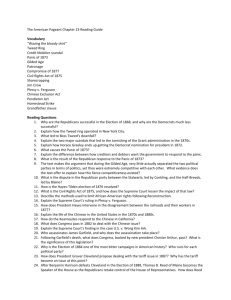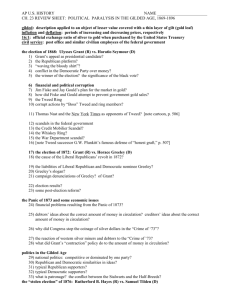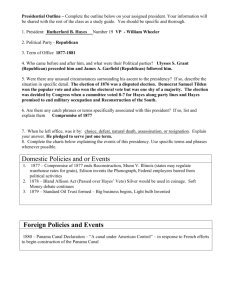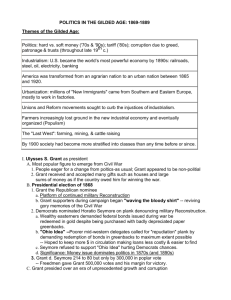Politics 1868 -1896
advertisement
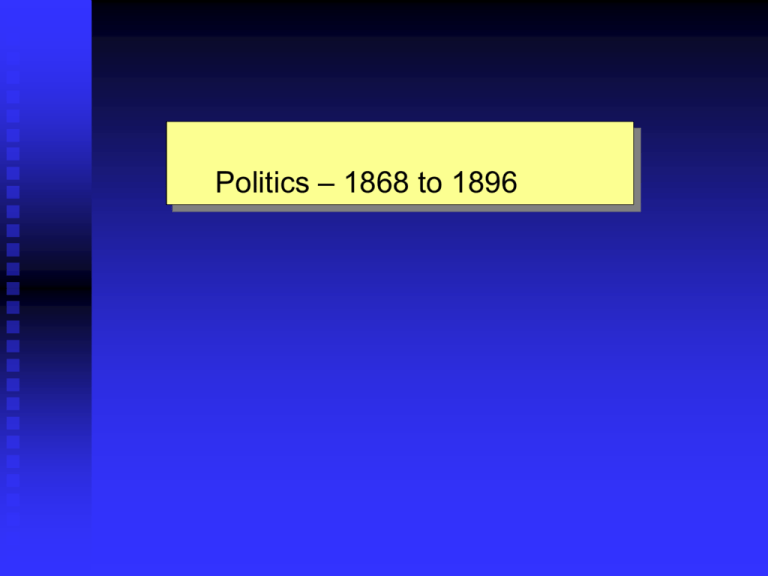
Politics – 1868 to 1896 Election of 1868 Radical Republicans chose U.S. Grant as their candidate. They were champions of a vigorous Southern reconstruction policy, defenders of Northern financial and business interests against Western agrarians and payment of public debt in gold. The Democrats chose Horatio Seymour who drafted a platform that Reconstruction was unconstitutional and favored the “Ohio Idea”that proposed government bonds should be paid in greenbacks rather than gold. Grant won 214 to 80 electoral votes but the white voters did not endorse the Radical Republicans. Grant’s Presidency 1868 -1872 Low standard of public morality Business leaders sought and received favors from the government for a price Government officials betrayed the interests of their constituents Politicians used public office as a source of private profit Problems under Grant 1. 2. 3. 4. Advisors – personal friends and relatives Gold conspiracy – Gould and Fisk attempted to corner the gold supply. Even though Grant at the last moment prevented the plot, it brought financial ruin to many on Black Friday, September 24, 1869. Tweed Ring – William “Boss” Tweed of Tammany Hall and his friends committed against New York City, Thomsa Nast’s political cartoons will help bring Tweed and his gang down in 1871. Credit Mobilier Scandal – graft and political connection with the building of the Union Pacific RR surfaced in 1872. Shares of stock were purchased by government officials in order to influence legislation. VP resigns thoroughly discredited. Dividends ranged up to 350%. Election of 1872 Democrats and Liberal Republicans nominated Horace Greely. LR opposed radical reconstruction, wanted civil service, lower tariffs, and against Grant’s corruption Greely carried only six states but liberals began to have an influence in policy Grant’s Presidency 1872 -1876 Salary Grab – Congress in 1873 voted a 50% salary increase for themselves - repealed next Congress Sanborn Contracts – In 1874, Sec. Of Treasury had to resign. He had permitted J.D. Sanborn to retain exorbitant commissions for collecting unpaid taxes. District Ring – Grant appoints the Governor of D.C. despite his known graft and corruption to head a commission . Senate refuses to ratify appointment. Whiskey Ring – Sec. Of Treasury Bristow uncovered a conspiracy to defraud the government of taxes on whiskey. Grant’s private secretary , O.E. Babcock, was involved. Belknap Scandal – Sec. Of War Belknap resigned before being impeached as he had accepted bribes for several years for trading on Indian reservations. Slaughter house cases – 1873 Panic of 1873 – set off a five year depression The Greenback Question 1. Crime of ’73 –to contract the volume of paper money greenbacks – to be redeemed only in gold. 2. Congress passes a bill in 1874 to add more Greenbacks into economy. Grant vetoes. 3. Specie Resumtion Act of 1874 – Greenbacks remain in circulation but after January 1, 1879 , redeemable at face value in gold. 4. Greenback Party created in 1875. It will decline due to the increase favoring of free and unlimited coinage of silver. Election of 1876 Hayes wins disputed elected. Reconstruction ends with Compromise of 1877 Events under Hayes Bland – Allison Act 1878 - $ 2 – 4 M worth of silver to be coined each month into silver dollars. Hayes vetoed but passed over his veto. January 1, 1879, greenbacks would be redeemed at face value in gold. Election of 1880 James Blaine –Rep. Ohio – wins election as a dark horse – a halfbreed Republican Party split His vice president Chester Arthur was a Stalwart A. Stalwarts – led by Roscoe Conkling – favored civil service reform B. Halfbreeds – led by James Blaine – partially favored civil service reform Solid South – after 1876 the Democrats could count on the South to vote Democratic. This will hold true for the next 100 years Waving the bloody shirt – Congressional members will place a bloody shirt from the Civil War and wave it on the floor to remind members of Congress about the Civil War. GOP – the Republican Party becomes known as the Grand Old Party Garfield is assassinated September 1881 Arthur’s Presidency Pendleton Act – 1883 – Civil service Reform Chinese Exclusion Act – 1882 – Burlingame Treaty 1868 granted Chinese subjects unrestricted rights of immigration and equality of treatment with other immigrants. Due to threat of Chinese competing with American labor, Chinese labor was excluded for 10 years. Pork Barrel Appropriations- Surplus in government treasury from 1870 –1880 allowed pork barrel projects to double. Congress approved improvements and public works in their respective districts. Election of 1884 Grover Cleveland (NY) wins over James Blaine (Maine) Reasons for Cleveland winning: A. Mulligan Letters B. Mugwumps C. Prohibitionists in upstate NY normally Republican voted Democrat D.” Rum, Romanism, Rebellion “ speech Cleveland’s Presidency Repeal of Tenure of Office Act Presidential Succession Act Dawes Act Interstate Commerce Act Pension controversy Tariff Controversy Election of 1888 Cleveland opposed the tariff Harrison favored the higher tariff to protect American industry Cleveland won the popular vote by 100,000 but lost the electoral vote 233 -168 Harrison’s Presidency Thomas “Czar” Reed is Speaker of the House . His power is enforced by defeating the Democrats at their attempt to take over Congressional power. Billion Dollar Congress – the surplus of money was dissipated through increased expenditures. Sherman Silver Purchase Act – 1890 – government to purchase $4.5 M of silver each month ; treasury notes redeemable in gold or silver McKinley Tariff – woolen and cotton goods, and steel products were increased Sugar subsidy – raw sugar on free duty list and granted a bounty of 2¢ a pound to domestic producers of raw sugar. Benefited American Sugar Refining Co. Sherman Anti – Trust Act – 1890 Election of 1892 James B. Weaver – Populist – 22 electoral votes Benjamin Harrison – Republican Grover Cleveland - Democrat Cleveland’s Presidency Panic of 1893 a. speculation b. government expenditures caused deficit c. hoarding of gold d. decline in confidence of government to meet its gold obligations e. gold reserve fell to below $100M Coxey’s Army 1893 Repeal of Sherman Silver Purchase Act 1893 Wilson Gorman Tariff 1893 Pollack v. Farmers Loan and Trust 1894 U.S. E.C. Knight Co. 1895 Morgan contract 1895 Pullman Strike 1894 Election of 1896 William McKinley – Republican – gold William Jennings Bryan – Democrat – silver Republican victory meant: 1. Dominace of Eastern business interests in government 2. Triumph of conservative financiersin fiscal ploicy 3. Defeat of farmers and laborers against industrialists
